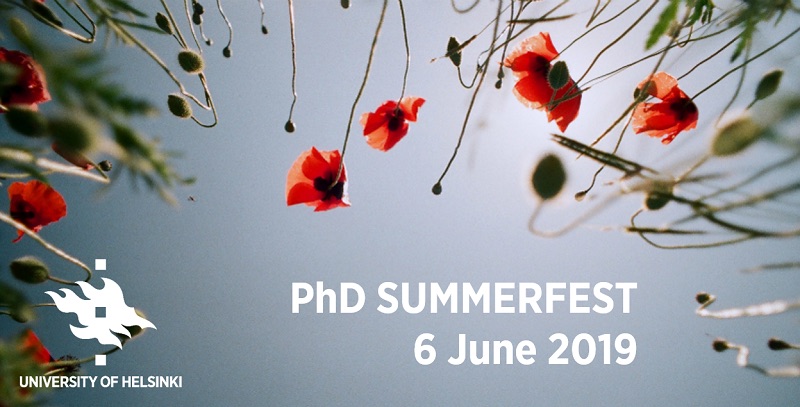RDHum 2019 3rd Call
Workshops and tutorials
The workshops and the tutorials in the RDHum 2019 conference in August 2019 in Oulu, Finland have been confirmed.
There are seven workshops and tutorials on the following topics:
- Compilation, management and usage of multimodal and audio-visual resources (2 events)
- Digital resources and services provided for the students and researchers by the National Library of Finland, The Language Bank of Finland, and the Helsinki Term Bank for the Arts and Sciences (3 events)
- R and Python environments in the analysis of digital resources (2 events).
Descriptions of the workshops and tutorials, as well as instructions how to participate, are available on the conference website. When applicable, registration for the workshops and tutorials can be made by contacting the organizers with contact information available in the descriptions of the workshops and tutorials. The participants are also asked to register for the conference, following the instructions published later. The website of the conference is available at https://www.oulu.fi/suomenkieli/node/55261.
The keynote speakers
The keynote speakers in the conference are Anna Čermáková, Arja Kuula-Luumi and Veronika Laippala. Anna Čermáková is currently a Marie Sklodowska-Curie Fellow at the University of Birmingham. Her paper discusses the intersection of digital research and children’s literature. Arja Kuula-Luumi, Development Manager at the Finnish Social Science Data Archive (FSD), gives an overview of the currently relevant issues of data protection in the humanities. in her presentation, Associate Professor in digital language research Professor Veronika Laippala from the University of Turku addresses Internet-based big data in research. The titles of the keynote papers can be found below, and the abstracts will be available on the conference website during February.
Abstracts for presentations and articles to be submitted on February 28 at the latest
There is still plenty of time for submitting the conference papers and articles. They can be submitted until February 28, 2019. More detailed information about the conference as well as the instructions can be found below and on the website of the conference.
Welcome to the conference!
Research Data and Humanities – RDHum 2019
University of Oulu, August 14-16, 2019
Digital resources and technology are used more and more within the humanities and the social sciences. Researchers in digital humanities gather, administer and share rapidly accumulating digital resources. They also need various research methods and tools in working with these resources. The conference Research Data and Humanities (RDHum) seeks to gather researchers around these themes. In addition to researchers, we invite teachers, graduate and postgraduate students as well as other interested parties to participate and to contribute.
RDHum 2019 is jointly organised by the University of Oulu and the University of Jyväskylä, in collaboration with FIN-CLARIN and Kielipankki, The Language Bank of Finland. The event is the first in the series of conferences taking place every other year in one of the universities within the FIN-CLARIN Consortium. The working languages in the conference are Finnish, Swedish and English.
The keynote speakers
- Anna Čermáková, Marie Sklodowska-Curie Fellow (Department of English Language and Linguistics, University of Birmingham)
Wicked witches and wise wizards: Children’s literature as an interdisciplinary meeting point in digital research
- Arja Kuula-Luumi, Development Manager (Finnish Social Science Data Archive (FSD), University of Tampere)
Tietosuoja ihmistieteissä
- Veronika Laippala, Associate Professor (University of Turku)
From bits and numbers to explanations – doing research on Internet-based big data
We welcome papers focusing on diverse topic areas, ranging from theoretical analyses to methodological and empirical studies but not limited to, the following:
Data and methodologies
- Compiling digital databases and infrastructures
- Digital data for less commonly used languages
- Digital data and research as pedagogical resources
- Search engines for digital data
- Annotating digital data
- Data mining and other exploratory approaches to digital data
- Links between digital data research and other methodologies (e.g. statistical and non-statistical methods)
- Synchronic or diachronic approaches
- Comparative and interdisciplinary studies
- Future technologies and innovations, e.g. virtual research environments
Research and findings in Digital Humanities
- e.g. in anthropology, arts, communication and media studies, education, geography, gender studies, history, information science, law, linguistics and translations studies, literature, queer studies, religious studies, sociology, social welfare
In addition to the regular papers, the conference provides a venue for workshops and tutorials. Please submit your proposal for a workshop or tutorial starting on December 1, 2018, but no later than December 31, 2018.
The workshops address a particular topic within the general theme of the conference, whereas tutorials can deal with specific types of resources, software or methods. Workshops and tutorials can also be designed with specific interest groups in mind, such as degree or postgraduate students. The chair of the workshop or tutorial is to submit an abstract (500 words) introducing the proposed topic, the aim of the event and the expected audience by December 31, 2018. The list of accepted workshops and tutorials will be announced on the website of the conference by January 15. After this, submissions to the workshops or tutorials can be made, following further instructions by the organizers.
Workshop and tutorial proposals must include information on at least the following aspects:
- workshop/tutorial title
- topic and goals of the workshop/tutorial
- workshop/tutorial organizer(s) and contact person(s)
- language(s) of the workshop/tutorial
- mode of organization and program design.
Please send your proposals to RDHum2019 [AT] oulu.fi.
The organizers of accepted workshops and tutorials will receive more detailed instructions on the administration of the workshops and tutorials after the proposals have been processed and decisions communicated.
We invite the following types of submissions that are listed below.
You may submit your abstract in one of the workshops or tutorials or, alternatively, in the general session. All abstracts will be submitted in EasyChair system. If you plan to submit a paper for publication, please submit it concurrently with your abstract in EasyChair. Instructions are available here.
- Abstract for a presentation (10 min + 5 min for discussion, or 20 min + 10 min for discussion) or poster.
Authors are invited to submit an abstract with the maximum length of 500 words. For a short presentation, the abstract must indicate the research question, the data and methods used (and preliminary results). A short presentation is recommended for presenting new and developing methods or other work in early stage. We also encourage students to contribute. For a long presentation, the abstract must indicate the research question, the data, the methods, and the results.
- Abstract and a short paper for a presentation (10 min + 5 min for discussion) or poster.
Authors are invited to submit an abstract with the maximum length of 500 words and a short paper (4-8) pages. The abstract must indicate the research question, the data and methods used, and preliminary results. Accepted short papers will be published in the electronic conference proceedings. Please note that the submission deadline is identical for both the abstract and the short paper.
- Abstract and a long paper for a presentation (20 min + 10 min for discussion) or poster.
Authors are invited to submit an abstract with the maximum length of 500 words and a long paper (8-12) pages. The abstract must indicate the research question, the data, the methods and the results. Accepted long papers will be published in the electronic conference proceedings. Please note that the submission deadline is identical for both the abstract and the long paper.
The instructions for formatting the papers are here.
The fee for attending the conference is 70 euros (35 euros for undergraduate students).
Important dates
- Submission of proposals for workshops and tutorials: December 1-31, 2018
- Acceptance of proposals for workshops and tutorials: January 15, 2019
- Submission of abstracts, short papers and long papers: January 16 – February 28, 2019
- Notification of acceptance of abstracts, short papers and long papers: April 2019
- Submission deadline of publication ready texts: June 9, 2019
- Conference: August 14-16, 2019
For more information, please send an inquiry to RDHum2019 [AT] oulu.fi.
Organizing committee
- Jarmo H. Jantunen, chair (University of Jyväskylä)
- Sisko Brunni (University of Oulu)
- Maria Frick (University of Oulu)
- Niina Kunnas (University of Oulu)
- Mietta Lennes (FIN-CLARIN)
- Santeri Palviainen (University of Oulu)
- Valtteri Skantsi (University of Oulu)
- Katja Västi (University of Oulu)
- Hanna Westerlund (FIN-CLARIN)
Scientific committee
- Jarmo H. Jantunen, chair (University of Jyväskylä)
- Sisko Brunni (University of Oulu)
- Ulla-Maija Forsberg (Institute for the Languages of Finland)
- Marja-Liisa Helasvuo (University of Turku)
- Ari Huhta (University of Jyväskylä)
- Dimitrios Kokkinakis (University of Gothenburg)
- Merja Koskela (University of Vaasa)
- Mikko Kurimo (Aalto University)
- Tommi Kurki (University of Turku)
- Krister Lindén (University of Helsinki)
- Pekka Manninen (CSC – IT Center for Science)
- Mikhail Mikhailov (University of Tampere)
- Eetu Mäkelä (University of Helsinki)
- Costanza Navarretta (University of Copenhagen)
- Minna Ruckenstein (University of Helsinki)
- Inguna Skadiņa (University of Latvia)
- Koenraad de Smedt (University of Bergen)
- Mikko Tolonen (University of Helsinki)
- Jurgita Vaičenonienė (Vytautas Magnus University)
- Kadri Vider (University of Tartu)
- Stefan Werner (University of Eastern Finland)

